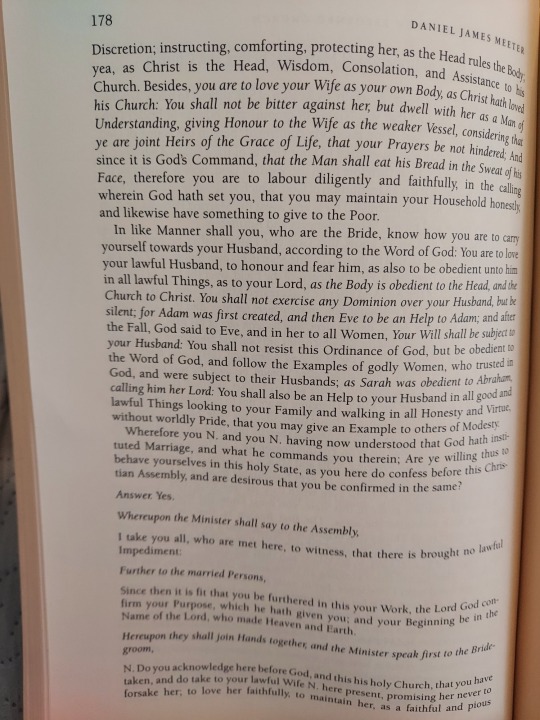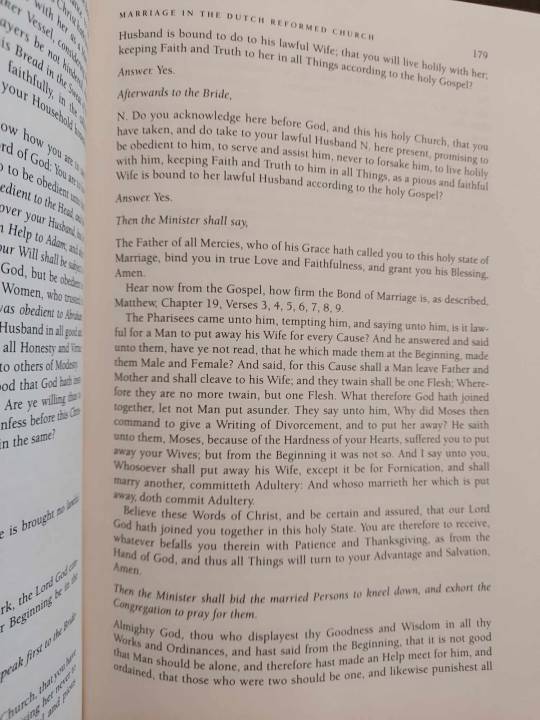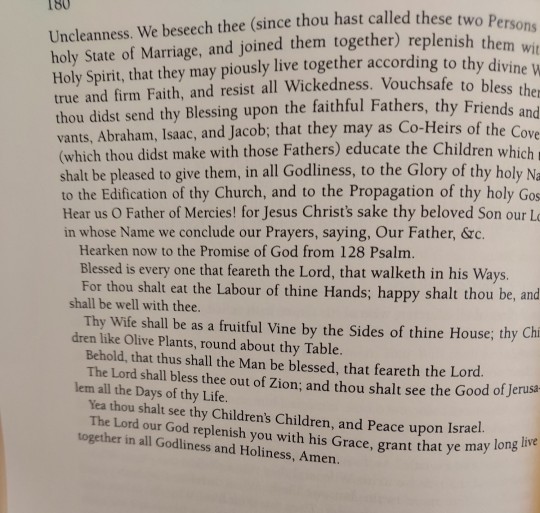#Heidelberg Catechism
Explore tagged Tumblr posts
Text
Ascension of the Lord (Acts 1:1-11)
Ascension Day often feels like the weird stepchild in the family of church events in the Christian Year. It’s often overlooked without ever really being missed.
In my former book, Theophilus, I wrote about all that Jesus began to do and to teach until the day he was taken up to heaven, after giving instructions through the Holy Spirit to the apostles he had chosen. After his suffering, he presented himself to them and gave many convincing proofs that he was alive. He appeared to them over a period of forty days and spoke about the kingdom of God. On…

View On WordPress
#acts#acts 1#acts of the apostles#ascension#ascension day#ascension of the lord#christ&039;s ascension#christian life#christian year#christianity#glorification#god&039;s glory#heidelberg catechism#holy spirit#jesus christ#king jesus#lord jesus#redemption#salvation#the church
0 notes
Text
The Heidelberg Catechism is a very beautiful work. I especially enjoyed part 3, which focuses on Gratitude
#christian#christianity#catechism#heidelberg catechism#reformed#reformed theology#my post#protestant#christblr
1 note
·
View note
Text
Enjoying God
On the heels of last week’s thoughts around conversational intimacy with God, this past week I felt God impressing upon my heart how much I enjoy my relationship with Him, and that I should tell you about that. Enjoy God? you may wonder. How is that possible? What does that even look like? These are natural questions, especially in light of the mental image of God we probably all grew up with:…

View On WordPress
0 notes
Text

0 notes
Text
The Constitution of the Presbyterian Church (U.S.A.)
I am a member and non-ruling elder of Westminster Presbyterian Church (Minneapolis), which is a member of the Presbyterian Church (U.S.A.) denomination. The latter’s Constitution consists of the following two parts. Part I: The Book of Confessions This Book contains the following confessions: The Nicene Creed (A.D. 381) The Apostles’ Creed (A.D. 180) The Scots Confession (1560) The Heidelberg…
View On WordPress
#A Brief Confession of Faith#Directory for Worship#Minneapolis Westminster Presbyterian Church#Presbyterian Book of Confessions#Presbyterian Book of Order#Presbyterian Church (U.S.A.)#Presbyterian Principles: God alone is Lord of the Conscience#Presbyterian Principles: It is our duty to exercise mutual forbearance toward each other#Presbyterian Principles: Truth is in order to goodness#Rules of Discipline#The Apostles’ Creed#The Confession of 1967#The Confession of Belhar#The Form of Government#The Foundations of Presbyterian Polity#The Heidelberg Catechism#The Larger Catechism#The Nicene Creed#The Scots Confession#The Second Helvetic Confession#The Shorter Catechism#The Theological Declaration of Barmen#The Westminster Confession of Faith
0 notes
Text
Lord, I Believe! Help My Unbelief!
In Mark 9:14-29, the weakness and limit of men is demonstrated, especially with regard to faith, and so is the answer to men's weakness:
Luke 17:5 (KJV), "And the apostles said unto the Lord, Increase our faith."
Mark 9:24, "And straightway the father of the child cried out, and said with tears, Lord, I believe; help thou mine unbelief."
“A weak faith may also be true faith, when it is otherwise of the right kind. A fire is not at once a bright blazing flame, but it often starts with a single spark.” - Otto Thelemann, An Aid to the Heidelberg Catechism, 79
Hebrews 12:2a, "Looking unto Jesus the author and finisher of our faith."
Notice what the Epistle to the Hebrews tells us, that Christ doesn't just finish or complete it but is the one who gives us the faith to begin with. This is why the Westminster Shorter Catechism puts it this way:
Question 86: What is faith in Jesus Christ?
Answer: Faith in Jesus Christ is a saving grace, whereby we receive and rest upon him alone for salvation, as he is offered to us in the gospel.
It is a saving grace, meaning it wholly begins with the gracious act of God, and doesn't begin with man or his acceptance. It is strengthened by Christ who works it in us by His Spirit completing that work at our death.
Praise God, our salvation relies not upon any faith made by the strength of men, but on a faithful Savior who is powerful, mighty, and gracious to save sinners.

18 notes
·
View notes
Text
Heidelberg Catechism questions 16 and 17
16. Why must He be a true and righteous man?
He must be a true man because the justice of God requires that the same human nature which has sinned avoid pay for sin.
He must be a righteous man because one who himself is a sinner canno pay for others.
17. Why must He at the same time be true God?
He must be true God so that by the power of His divine nature He might bear in His human nature the burden of God's wrath, and might obtain for us and restore to us righteousness and life.
12 notes
·
View notes
Text
popping my head through your window (and possibly shattering the glass woops) to say: I am alive! I've been spending time with family, studying (I can safely say now that Professor Joy is the best and I would 10/10 follow her back to England to take her course at King's College if it weren't for the financial part. She was SO lovely and her class was amazing), preparing for fall classes, chipping away steadily at my essays and my fairy tale novel, hammering out the occasional blog post or poem, cooking, sleeping (or trying to, anyway), doing social things (I had one thing almost every day this week and it just about killed me. Thank God the person I was supposed to meet up with today cancelled, otherwise I'd be pretty much dead), reading TONS (am currently reading Sophie's World, War and Peace, Aggressively Happy, Jamie Smith's On the Road, Gordon Fee's How to Read the Bible for All Its Worth, and the Heidelberg Catechism for kicks, as well as working my way through a few class readings), and have caught up with a few stories I meant to catch up with (in other words: went to watch Barbie in the theatres, which was brilliant and not what I expected, and finished The Bear season 2, which.... I don't know, guys, it was a Lot). Things have been BUSY on the school front and many concerning things have been revealed BUT all is well and all shall be well!!
I shall be back in September. At present things are still SUPER busy. But I shall keep y'all in my prayers! Miss you and love you!!
#this fall semester is going to be Interesting#(@gracie you thought i had tons of midterms last year?? girl i'm taking FIVE english classes this semester....... i'm literally going to be#up to my eyebrows in midterm essays tests and exams in a handful of months)#anywayyyy it has been intermittently emotionally draining because previous church drama#also i have not yet chosen a church to attend which is suchhhh a hard decision to make. after the last one i've found that i'm actually a#lot more reluctant/hesitant/scared to commit to a church out of fear of being unpleasantly surprised again#but i'm trying to work through that!#but overall everything is fine and i am slowly getting up to speed on a lot of things i was behind on#God is good y'all! and very kind in the midst of all This!
28 notes
·
View notes
Text
What are two important aspects of Christian baptism that every believer should know?
“Scripture calls baptism the washing of rebirth and the washing away of sins.” The Heidelberg Catechism, first published in 1563, is a highly regarded summary of the Christian faith and has the following to say about the significance of baptism…
4 notes
·
View notes
Text
has anyone in the exchristian community studied the heidelberg catechism in depth? it is so disturbing to me that i've looped back around to fascination. i may write some essays about it, so i am trying to understand it as much as i can. there is so so so much to unpack and it's honestly overwhelming.
any perspectives other than my own about this would be much appreciated!
#exchristian#ex christian#exvangelical#atheism#deconstruction#deconstructing christianity#deconvert#deconversion#atheist
5 notes
·
View notes
Text
The Ten Commandments (Exodus 20:1-21)
Since relationships are important and necessary, we need a way to be in community together so that everyone can get along and thrive as human beings.
The Ten Commandments by He Qi Then God gave the people all these instructions: “I am the Lord your God, who rescued you from the land of Egypt, the place of your slavery. “You must not have any other god but me. “You must not make for yourself an idol of any kind or an image of anything in the heavens or on the earth or in the sea. You must not bow down to them or worship them, for I,…

View On WordPress
#decalogue#exodus#exodus 20#freedom#god&039;s instructions#god&039;s commands#heidelberg catechism#interpersonal relations#moses#relational connection#relationships#social expectations#social relationships#spiritual life#ten commandments#ten words
0 notes
Note
What do you like about the Reformed tradition?
Asking as someone who doesn't like Reformed theology, I want to hear the opinion of a Reformed person on its appeal.
Hey! Thanks for asking. :)
Short answer: it is what I find to be consistent with Scripture.
For the long answer:
I appreciate that it is historical and confessional. We know traditions can either be a curse or a blessing for the church. It can be harmful when we treat it as if it has divine authority (Matt. 15:6-9), but it can be beneficial when each generation thoughtfully receives, examines, and passes on what earlier believers learned from the prophetic and apostolic teachings (2 Tim. 2:2). We should look to the “old paths” (Jer. 6:16) to uphold “the faith that was once for all entrusted to the saints” (Jude 3).
And so, reformed theology informs our faith with long-established Christian doctrinal standards, including the Belgic Confession, the Heidelberg Catechism, the Canons of Dort, the Westminster Confession and Catechisms, and the Second London Baptist Confession.
The Bible is upheld in a high manner as it should be since all Scripture is inspired or "breathed out" by God. Sadly, this is not the case in many churches, and I can attest to that as I used to go to a church that did not teach Scripture exegetically.
Reformed theology encompasses the biblical teachings about God’s eternal nature and His works in creation, providence, and governance; the origin and nature of humanity, our fall into sin, and its consequences; the glorious person and natures of Christ, His roles, incarnation, suffering, death, and the resulting glory; the work of the Holy Spirit in creation and redemption; the church, including its structure, mission, and practices; the Christian experience of grace, a life of gratitude and obedience to God’s law, and the practice of prayer; and ultimately, the glorious future that awaits as God fulfills His holy will. Reformed theology aims to communicate “the whole counsel of God” (Acts 20:27) as revealed to us (Deut. 29:29).
I like Reformed theology, because, at the heart of it—and the very reason for human existence—is the belief that we were made “to glorify God and enjoy him forever,” as stated in the Westminster Shorter Catechism.
4 notes
·
View notes
Text
The Hamiltons and their Dutch Reformed wedding
[Text from Religions of the United States in Practice, Volume 1].

Alexander Hamilton and Elizabeth Schuyler were married on Thursday, December 14, 1780, in the largest parlor of her parents’ Albany mansion, by a minister of the Dutch Reformed Church, as is recorded in the church registry of the Reformed Dutch Church of Albany (now First Church in Albany). Domine Eilardus Westerlo,* the second husband of Catharina Livingston Van Rensselaer (mother of Stephen Van Rensselaer III) had presided at Angelica and John Church’s wedding at the Van Rensselaer Manor house north of Albany three years prior, but it’s unknown to me if he also was the minister for the Hamilton wedding.
It’s easy to speculate that AH, at least, thought that he and Eliza would be married at Morristown that spring 1780 - it was not common to have an engagement lasting several months, and it would have made sense to get married before the campaign. Morristown had both Anglican and Presbyterian ministers. But Philip Schuyler poured cold water on that, stating in a letter that it would not be proper for them to be married at Morristown (and certainly, not to elope). In one of his letters to his fiancee AH complains that their engagement has lasted “an age,” and in another asks if she would still like to elope - it’s easy to see that he was going along with this delay to make her family happy.
If AH, who stated in 1771 that he was a member of the English Reformed Church, and then had ties through Rev. Knox to the Scotch Presbyterian Church, had mixed feelings about marrying in the Dutch Reformed tradition, it is unrecorded, although he is quoting from the Anglican marriage rite in his Oct 1780 letter to Eliza and his reference to “nuptial benediction” is from Anglicanism (I wonder if he grimaced when he read this totally non-poetic marriage rite below, compared to this one). He and Eliza’s first child, Philip, was baptized at the Reformed Dutch Church of Albany on Feb 11, 1782, with Philip’s grandparents as witnesses. And maybe AH really took the marital admonitions from this Liturgy (quoting Matthew 19) to heart [see page 3 below], as he supported folks only being allowed to divorce in the case of adultery (not for cruelty, not for abandonment), which remained NY state law until 1967.
So let’s talk cool facts about the Dutch Reformed tradition in America:
One book that every (Dutch American) colonial family was certain to possess was a kerkboekje (church book) - containing the Dutch metrical Psalter (with the Genevan tunes), the Heidelberg Catechism, and the Netherlands Liturgy - which they carried with them to church every Sunday. In more well-to-do families, every person had a kerboekje of his or her own. Because of their high birth rate, Dutch Americans were able to maintain their language and culture under the English regime for another century. Their culture was so tenacious that the French and German immigrants who later settled in the Hudson Valley adopted Dutch as their language rather than English. [Here I interject that Sojourner Truth, born into slavery in 1797 in Swartekill, NY, was a native Dutch speaker who likely never lost that accent - her “Ain’t I a Woman?” speech was translated to a Southern dialect.]
After a hundred years of English rule, however, Dutch eventually lost its place as the language of New York and New Jersey.
English language preaching was introduced in 1763, and the church book was translated to English in 1767, becoming the New York Liturgy that became standard across all English-speaking Dutch Reformed Churches in the world. (Services in Albany would stay in Dutch through most of the 1780s, although I’m certainly hoping that their wedding wasn’t in Dutch, a language that I don’t believe we have any record of AH speaking.) This language certainly doesn’t have the flourishes of the Anglican liturgy - it’s pretty appalling from a literary point of view.
We know that Dutch women enjoyed stronger inheritance rights and a more elevated status than did their English peers. In cases of Dutch-English intermarriage, the couples usually ended up Dutch Reformed.
Obviously not the Hamiltons, who after Philip would baptize their next three children in the Episcopal Church (the Anglican Church of the USA) in 1788; the Hamiltons would remain Episcopalians for generations. Angelica Schuyler Church also became Episcopalian (and is the one we actually have a contemporary record of going to church with her own and the Hamilton children, other than presumed attendance for baptisms and at the 1st inauguration of GW), which makes total sense since she married an Englishman. It also makes sense that AH would return to the religious liturgies of his youth [See my lengthy post about the Hamiltons’ religious preferences.]
Getting back to the wedding stuff - although this researcher states that marriages were usually in church, I suspect that was for the plebs. Other books cite wealthy Dutch-Americans marrying at their homes, and then the bride wearing her finest outfit to church on the Sunday following her wedding. I have never found a reference to the Schuylers as a particularly pious family, nor have I found a reference to Philip Schuyler maintaining a pew for his family at the church in Albany. His youngest daughter does not cite him as an attendant, but as someone who kept private devotions and would sometimes recite a prayer service for the household (this was not at all uncommon).
Dutch American weddings were big, community, raucous affairs, almost everyone agrees. “Complaints about carousing and excessive drunkenness were not uncommon.” Philip and Catharine likely wanted to throw such a party!
Although they clearly wanted to witness and then throw a crazy party afterwards, Elizabeth’s parents would have played no role in the wedding itself. There was no giving away of the bride as there is in the Anglican rite, where the father (usually) affirms that he is giving “this woman to be married to this man.” Instead, this was a ceremony for two grown sober adults, choosing to live in the Married State, the Institution of God [see below].
Anyway, getting to the real point: below are my not-good photos of the form of marriage of the New York Liturgy. Considering the dates of this liturgy, this is likely what was read to and said by the Hamiltons at their wedding. This has some typical Reformed catechesis - “God will...judge and punish Whoremongers and Adulterers,” “Resist all Wickedness,” “Believe these Words of Christ, and be certain and assured, that our Lord God had joined you together in this holy State. You are therefore to receive, whatever befalls you therein with Patience and Thanksgiving, as from the Hand of God, and thus all Things will turn to your Advantage and Salvation.” It even starts off with such a great tone: “Whereas Married Persons are generally, by Reason of Sin, subject to many Troubles and Afflictions...”
A line that is unfamiliar to me from other Christian marriage rites: “[to the husband]..you are to labor diligently and faithfully, in the calling wherein God hath set you, that you may maintain your Household honestly, and likewise have something to give to the poor” [my emphasis]. And I am unaware of any other major Christian marriage rite that so blatantly states St. Paul’s admonition to get married to avoid fornication. Calvinism can be so grim (my apologies to any Calvinists reading this, but not really).




If you’ve made it this far, perhaps you’d also like to read about Dutch epithalamia. Epithalamia were wedding poems/songs - more specifically, for the marital bed/consummation - that were popular all the way from the classical period (they likely arose from the very elaborate wedding rituals of the past ancient Greeks/Balkan peoples) but largely disappeared in the late 19th century and have now been forgotten. There was quite a lot of literature/pamphlets/instruction manuals(?) about how to approach one’s wedding night; epithalamia was the far more naughty/raucous cousin to this literature. But I don’t think anyone really took some of this literature seriously:
...The chapter titled ‘Bruyt’ (Bride) highlights how respectable Protestants wished newly-weds the joys of a chaste Christian marriage and advocated the creation of a devotional atmosphere before becoming one flesh. Cats’s instructions about the wedding day cover various topics, such as the behaviour of the wedding guests, the bride and groom’s mental preparation, orchestrating the mood of the wedding banquet, the symbolic meaning of the bride’s crown, conduct at the nuptial bed, and pious conversation between bride and groom.
* h/t to Dr. Tom Cutterham for this, who is also working on a biography (and working to get a publisher for said biography) on Angelica Schuyler Church “which explores the processes of bourgeois class-formation in this period through the lens of her ideas, exploits, and transatlantic voyages.” He’s already released some of his research/early thoughts on “The Labor of Bourgeois Sexuality” during this period, or listen to the podcast, in which he reads from a section of his biography on ASC’s social climbing to get her husband into Parliament, including a ‘risque’ section of a letter from Baron von Steuben to Church.
#Alexander Hamilton#Elizabeth Schuyler Hamilton#Dutch Reformed Church#18th century marriage#Angelica Schuyler Church
11 notes
·
View notes
Text
Belong
The first question and answer in the Heidelberg Catechism is intended as an introduction, setting the tone and the context for all that is to follow. So it talks about comfort and belonging. The rest of the catechism is going to be broken up into three sections, those are outlined in the second question and answer, and it’s going to be heavy going. The first section is all about sin. But before…
0 notes
Text
What is your only comfort in life and in death?
That I am not my own, but belong—body and soul, in life and in death—to my faithful Savior, Jesus Christ!
~ Heidelberg Catechism [1563]
0 notes
Text
I can only speak for Madoka because I haven’t watched Utena, so let me, someone who has gone to church for 30+ years and has edited my dad’s papers and thesis for his theology PhD, to chime in.
The obvious parallel is how Madoka becomes the salvation of magical girls. For a more in-depth analysis, you’ll have to go back to the Old Testament.
Before Christ, forgiveness for one’s sins were done symbolically by burnt sacrifice. You can get the entire rundown in Leviticus, but the gist of it would be that there’s a symbolic transfer of sins to the sacrifice before it is burned as atonement for your sins.
Similarly, the maintenance of a soul gem can only be cleansed by using grief seeds (then “sacrificed” to kyubey)(equating the Christian god with a cosmic alien manipulator will probably get my Christian card revoked but fuck it let’s do it). Both methods are incomplete, one being completely symbolic and the other unsustainable in the long term.
The concept of sin can be applied to magical girls if we think of them of being “birthed” by kyubey and their wish. Where Madoka/Jesus comes in is how they bring salvation to the people who are stuck in this incomplete system, where their only option is death.
According to the Heidelberg Catechism:
Q. Why must the mediator be a true and righteous human?
A. God’s justice demands that human nature, which has sinned, must pay for sin; but a sinful human could never pay for others.
Extended to the Madoka-verse, only as a magical girl can Madoka pay for the wishes of other magical girls.
After their sacrifice to take away the burdens of sins and wishes, there is still sin, death and despair. However, the way to life after death is opened up by taking away the thing that would damn a soul to a second, eternal death.
tl;dr Madoka is totally Jesus.
Everyone knows that yaoi Jesus is Aoba but is yuri Jesus Madoka or Utena? Please discuss and support your stance with evidence
#puella magi madoka magica#*breaks down door*#DID SOMEONE SAY JESUS AND ANIMEEEE??????#I wrote this after two nights of getting only 5 hours of sleep#this whole thing kinda breaks down when you want to get into who God the Father is#could be kyubey or homura#ready to be cancelled by Christian tumblr
200 notes
·
View notes